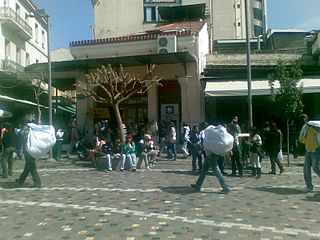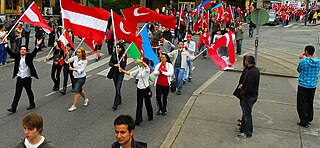
Foreign workers or guest workers are people who work in a country other than one of which they are a citizen. Some foreign workers use a guest worker program in a country with more preferred job prospects than in their home country. Guest workers are often either sent or invited to work outside their home country or have acquired a job before leaving their home country, whereas migrant workers often leave their home country without a specific job in prospect.
Since 1945, immigration to the United Kingdom, controlled by British immigration law and to an extent by British nationality law, has been significant, in particular from the Republic of Ireland and from the former British Empire, especially India, Bangladesh, Pakistan, the Caribbean, South Africa, Nigeria, Ghana, Kenya, and Hong Kong. Since the accession of the UK to the European Communities in the 1970s and the creation of the EU in the early 1990s, immigrants relocated from member states of the European Union, exercising one of the European Union's Four Freedoms. In 2021, since Brexit came into effect, previous EU citizenship's right to newly move to and reside in the UK on a permanent basis does not apply anymore. A smaller number have come as asylum seekers seeking protection as refugees under the United Nations 1951 Refugee Convention.

Repatriation is the return of a thing or person to its or their country of origin, respectively. The term may refer to non-human entities, such as converting a foreign currency into the currency of one's own country, as well as the return of military personnel to their place of origin following a war. It also applies to diplomatic envoys, international officials as well as expatriates and migrants in time of international crisis. For refugees, asylum seekers and illegal migrants, repatriation can mean either voluntary return or deportation.

Gastarbeiter are foreign or migrant workers, particularly those who had moved to West Germany between 1955 and 1973, seeking work as part of a formal guest worker program. As a result, guestworkers are generally considered temporary migrants because their residency in the country of immigration is not yet determined to be permanent. Other countries had similar programs: in the Netherlands and Belgium it was called the gastarbeider program; in Sweden, Denmark, Norway and Finland it was called arbetskraftsinvandring (workforce-immigration); and in East Germany such workers were called Vertragsarbeiter. The term that was used during the Nazi era was Fremdarbeiter. However, the latter term had negative connotations, and was no longer used after World War II.

A migrant worker is a person who migrates within a home country or outside it to pursue work. Migrant workers usually do not have an intention to stay permanently in the country or region in which they work.

Immigration to Germany, both in the country's modern borders and the many political entities that preceded it, has occurred throughout the country's history. Today, Germany is one of the most popular destinations for immigrants in the world, with well over 1 million people moving there each year since 2013. As of 2019, around 13.7 million people living in Germany, or about 17% of the population, are first-generation immigrants.
Chain migration is the social process by which immigrants from a particular area follow others from that area to a particular destination. The destination may be in another country or in a new location within the same country.

Immigration is the international movement of people to a destination country of which they are not usual residents or where they do not possess nationality in order to settle as permanent residents. Commuters, tourists, and other short-term stays in a destination country do not fall under the definition of immigration or migration; seasonal labour immigration is sometimes included, however.
Migrant literature, sometimes written by migrants themselves, tells stories of immigration.
Opposition to immigration, also known as anti-immigration, is a political ideology that seeks to restrict the incoming of people from one area to another. In the modern sense, immigration refers to the entry of people from one state or territory into another state or territory in which they are not citizens in contrast, but closely correspond to emigration which refers people leaving one state or territory in which they are citizens. Illegal immigration occurs when people immigrate to a country without having official permission to do so. Opposition to immigration ranges from calls for various immigration reforms, to proposals to completely restrict immigration, to calls for repatriation of existing immigrants.
Illegal immigration is the migration of people into a country in violation of that country's immigration laws, or the continuous residence in a country without the legal right to. Illegal immigration tends to be financially upward, from poorer to richer countries. Illegal residence in another country creates the risk of detention, deportation, and/or other sanctions.

Immigration to Greece percentage of foreign populations in Greece is 7.1% in proportion to the total population of the country. Moreover, between 9 and 11% of the registered Greek labor force of 4.4 million are foreigners. Migrants additionally make up 25% of wage and salary earners.

Turks in Austria, also referred to as Turkish Austrians and Austrian Turks, are people of Turkish ethnicity living in Austria. They form the largest ethnic minority group in the country; thus, the Turks are the second largest ethnic group in Austria after the ethnic Austrian people. The majority of Austrian Turks descend from the Republic of Turkey; however, there has also been significant Turkish migration from other post-Ottoman countries including ethnic Turkish communities which have come to Austria from the Balkans, the island of Cyprus, and more recently Iraq and Syria.

Vietnamese people in Germany form one of the country's largest groups of resident foreigners from Asia. Federal Statistical Office figures show 103,260 Vietnamese nationals residing in Germany at the end of 2020, which is the fourth largest community from Asia excluding transcontinental, Caucusus and Middle Eastern states. Not included in those figures are individuals of Vietnamese origin or descent who have been naturalised as German citizens. Other data from 2020 shows 183,000 people of Vietnamese descent, of which 117,000 have a migration background.
Return migration refers to the individual or family decision of a migrant to leave a host country and to return permanently to the country of origin. Research topics include the return migration process, motivations for returning, the experiences returnees encounter, and the impacts of return migration on both the host and the home countries.

Emigration from Mexico is the movement of people from Mexico to other countries. The top destination by far is the United States, by a factor of over 150 to 1 compared to the second most popular destination, Canada.
Denmark has seen an increase in immigration over the past 30 years, with a large part of the immigrants originating from non-Western countries. As of 2014, more than 8 percent of the population of Denmark consists of immigrants. As of Q2 of 2022, the population of immigrants is 652,495, excluding Danish born descendants of immigrants to Denmark. This shift in demographics has posed challenges to the nation as it attempts to address cultural and religious differences, labour shortages, employment gaps, education of immigrants and their descendants, spatial segregation, crime rates and language abilities.

Migrant crisis is the intense difficulty, trouble, or danger situation in the receiving state due to the movements of large groups of immigrants escaping from the conditions which negatively affected their situation at the country of origin (departure). The "crisis" situation is not the refugee numbers but the system's failure to respond in an orderly way to the government's legal obligations. Some notable crises are; European migrant crisis, English Channel migrant crisis and World War II evacuation and expulsion.

Voluntary return or voluntary repatriation is usually the return of an illegal immigrant or over-stayer, a rejected asylum seeker, a refugee or displaced person, or an unaccompanied minor; sometimes it is the emigration of a second-generation immigrant who makes an autonomous decision to return to their ethnic homeland when they are unable or unwilling to remain in the host country.
Christian Dustmann, FBA, is a German economist who currently serves as Professor of Economics at the Department of Economics of University College London. There, he also works as Director of the Centre for Research and Analysis of Migration (CReAM), which he helped found. Dustmann belongs to the world's foremost labour economists and migration scholars.











